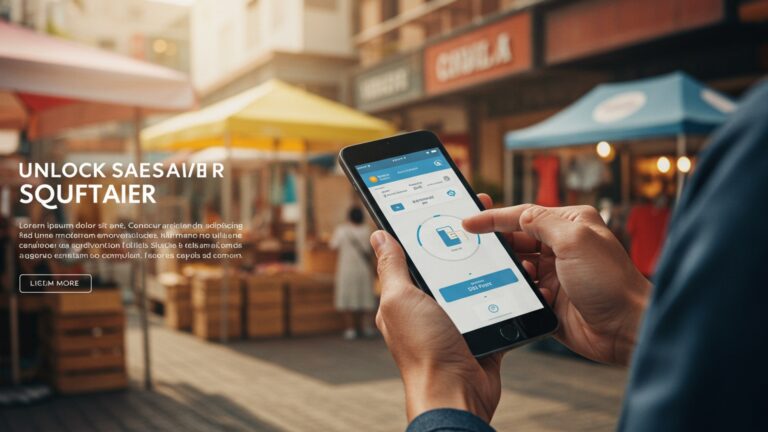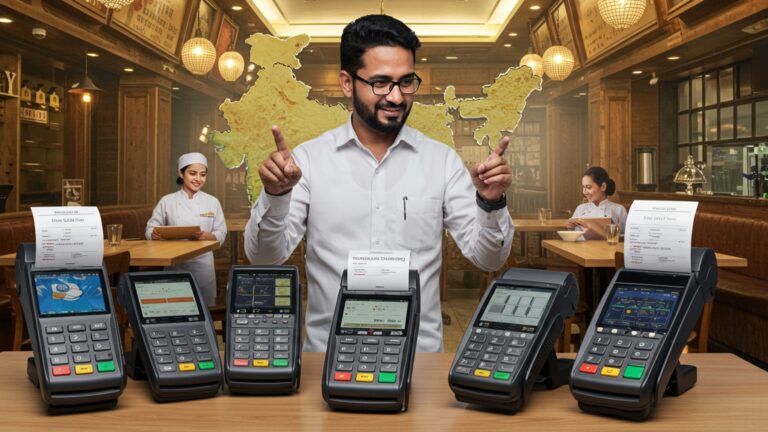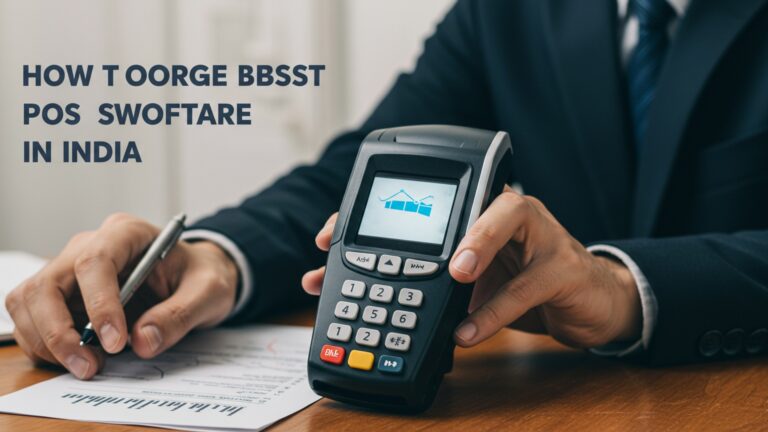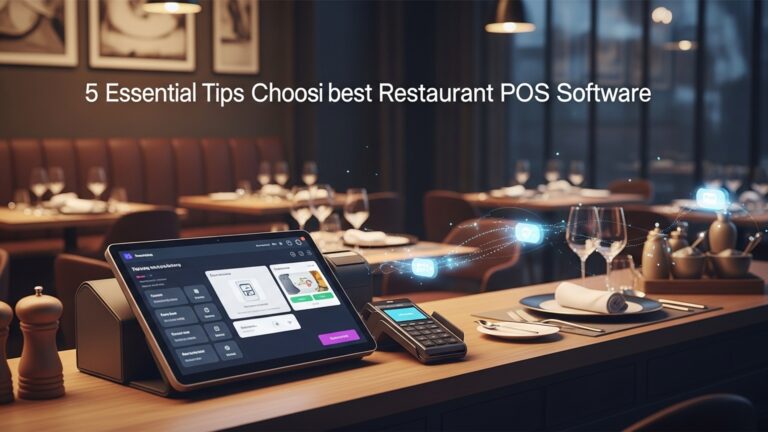How to Select the Best POS Software in India A Comprehensive Guide
Navigating India’s dynamic market, businesses from bustling Mumbai retail chains to burgeoning Bengaluru cafes grasp that selecting the best POS software in India is pivotal, extending far beyond simple transactions. Modern solutions, increasingly cloud-native and mobile-enabled, integrate critical functionalities like real-time inventory synchronization, comprehensive customer relationship management. direct UPI payment processing, a vital trend in India’s digital economy. An ill-suited system, lacking features like multi-store management or robust GST reporting, can bottleneck growth and operational efficiency. Entrepreneurs must meticulously evaluate platforms that offer scalability and localized compliance, transforming operational challenges into strategic advantages.
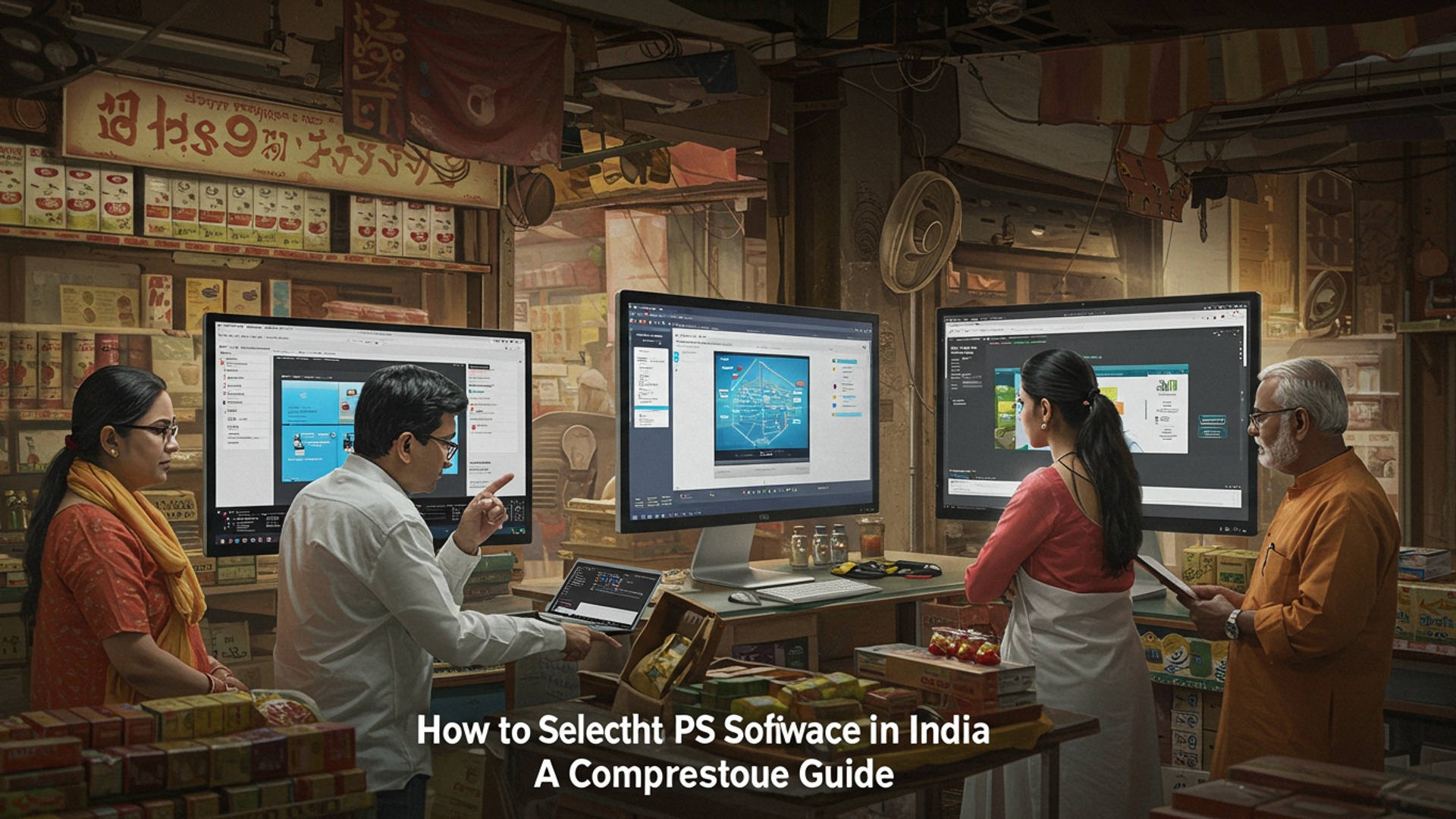
Understanding POS Software: The Digital Backbone of Modern Businesses
In today’s fast-paced retail and service landscape, a Point-of-Sale (POS) system is far more than just a cash register. It’s the central nervous system of your business operations, streamlining everything from sales transactions to inventory management and customer relationship building. At its core, POS software is a sophisticated system that processes customer purchases, records sales data. often integrates with other business functions. For businesses in India, embracing robust POS technology is no longer an option but a necessity to stay competitive and efficient.
Imagine a customer making a purchase. The POS system quickly scans the item, calculates the price, applies any discounts, processes the payment (cash, card, UPI, etc.). generates a receipt. But its capabilities extend far beyond this basic function. Modern POS solutions handle inventory tracking, employee management, sales reporting. even customer loyalty programs. This comprehensive functionality is why selecting the best pos software in India is a critical strategic decision for any growing enterprise.
Why a Robust POS System is Indispensable for Indian Businesses
The Indian market presents unique opportunities and challenges. A diverse customer base, varied payment preferences. the rapid adoption of digital technologies mean that businesses need tools that are flexible, scalable. locally attuned. Here’s why a powerful POS system is crucial:
- Enhanced Efficiency: Automates tedious tasks like billing, inventory updates. sales reporting, freeing up staff to focus on customer service.
- Improved Accuracy: Minimizes human error in pricing, stock counts. financial reconciliation, leading to fewer discrepancies and better decision-making.
- Better Inventory Management: Real-time tracking of stock levels helps prevent overselling or stockouts, optimizing purchasing and reducing waste.
- In-Depth Sales Analytics: Provides valuable insights into sales trends, peak hours, popular products. employee performance, enabling data-driven strategies.
- Superior Customer Experience: Faster checkouts, personalized offers. loyalty programs built into the POS enhance customer satisfaction and encourage repeat business.
- Adaptability to Payment Methods: Seamlessly integrates with various Indian payment gateways, including UPI, digital wallets. traditional card payments, catering to diverse customer preferences.
- Regulatory Compliance: Helps maintain accurate financial records, simplifying tax filing and ensuring compliance with local regulations.
Key Features to Prioritize in Your POS Software Selection
When searching for the best pos software in India, certain features stand out as non-negotiable for driving business growth and operational excellence. Here’s a breakdown of what to look for:
- Sales and Transaction Management:
- Quick and intuitive interface for processing sales.
- Ability to handle various payment methods (cash, credit/debit cards, UPI, digital wallets).
- Discount and promotion management.
- Returns, refunds. exchanges functionality.
- Split payments and layaway options.
- Inventory Management:
- Real-time stock tracking across multiple locations.
- Automated low-stock alerts.
- Vendor management and purchase order creation.
- Barcode scanning and printing capabilities.
- Batch and serial number tracking (for specific industries).
- Customer Relationship Management (CRM):
- Customer database for contact details and purchase history.
- Loyalty programs and reward points management.
- Personalized marketing and communication tools.
- Employee Management:
- Time clock and attendance tracking.
- Sales performance monitoring.
- Permission-based access control for different roles.
- Reporting and Analytics:
- Comprehensive sales reports (daily, weekly, monthly, yearly).
- Inventory reports, profit and loss statements.
- Employee performance reports.
- Customizable reporting options for specific business needs.
- Offline Mode Capability: Essential for areas with unreliable internet connectivity, allowing transactions to continue and sync once online.
- User-Friendly Interface: An intuitive design reduces training time and increases staff efficiency.
Industry-Specific Considerations: Tailoring POS to Your Business Type
While core functionalities are universal, the best pos software in India often offers specialized features catering to different industries. Recognizing these specific needs is crucial for an optimal selection.
- Retail (Fashion, Electronics, Groceries):
- Variant management (sizes, colors for apparel).
- Serial number tracking for electronics.
- Bulk purchasing and expiry date management for groceries.
- Integration with e-commerce platforms for omnichannel sales.
- Loyalty programs to foster repeat business.
- Restaurants and Cafes (F&B):
- Table management and order routing to kitchen/bar.
- Menu customization and modifiers (e. g. , “no onion,” “extra cheese”).
- KDS (Kitchen Display System) integration.
- Online ordering and delivery integration.
- Ingredient-level inventory tracking.
- Split billing and tip management.
- Salons and Spas:
- Appointment scheduling and management.
- Service package creation and tracking.
- Stylist/therapist commission management.
- Customer profiles with service history and preferences.
- Small Businesses/Mom & Pop Stores:
- Cost-effectiveness and ease of use are paramount.
- Essential features without unnecessary complexity.
- Strong local support.
Deployment Models: Cloud-Based vs. On-Premise POS
The choice between cloud-based and on-premise POS systems significantly impacts your operational flexibility, cost. data accessibility. Understanding the distinctions is key to selecting the right fit for your Indian business.
| Feature | Cloud-Based POS | On-Premise POS |
|---|---|---|
| Data Storage | Hosted on remote servers (internet connection required for primary operations). | Data stored locally on your own servers within the business premises. |
| Accessibility | Access from anywhere, any device with internet. Ideal for multi-location businesses. | Typically accessible only within the local network; remote access requires additional setup. |
| Cost Structure | Subscription-based (monthly/annual fees). Lower upfront cost. | Higher upfront cost for hardware, software license. installation. Lower ongoing subscription. |
| Maintenance & Updates | Managed by the vendor; automatic updates and security patches. | Requires in-house IT team or third-party vendor for maintenance, updates. backups. |
| Scalability | Easily scalable; add or remove terminals/locations with minimal effort. | Scaling often requires significant hardware upgrades and IT intervention. |
| Security | Managed by professional data centers with robust security protocols. | Relies on your internal security measures, which can be vulnerable if not well-maintained. |
| Offline Capability | Many offer an “offline mode” to continue operations during internet outages, syncing data later. | Fully functional without internet. remote backups or updates still require connectivity. |
For many Indian businesses, especially those with multiple outlets or a desire for remote management, cloud-based POS often emerges as the more agile and cost-effective solution in the long run. But, businesses with specific security or regulatory needs might still prefer the control offered by on-premise systems.
The Power of Integration: Connecting Your Business Ecosystem
A truly effective POS system doesn’t operate in a vacuum. Its ability to seamlessly integrate with other business tools is a hallmark of the best pos software in India. These integrations create a unified ecosystem, eliminating data silos and enhancing overall efficiency.
- Accounting Software (e. g. , Tally, QuickBooks): Automatically syncs sales data, expenses. inventory values, simplifying bookkeeping and financial reporting.
- E-commerce Platforms (e. g. , Shopify, WooCommerce): Crucial for omnichannel retailers, ensuring consistent product, pricing. inventory data across online and offline channels.
- Payment Gateways (e. g. , Razorpay, PayU, Paytm): Facilitates secure and diverse payment processing, including UPI, debit/credit cards. digital wallets.
- CRM Systems: Enriches customer profiles with purchase history from POS, allowing for more targeted marketing and personalized service.
- Loyalty Programs: Integrates customer points, rewards. discount redemption directly at the point of sale.
- ERP Systems: For larger enterprises, integration with Enterprise Resource Planning software provides a holistic view of the entire business operation.
Before committing to a POS solution, always inquire about its existing integrations and API capabilities. A system that can connect with your current or future essential tools will save you immense time and prevent data entry errors.
Scalability and Future-Proofing Your Investment
Your business isn’t static. neither should your POS system be. The best pos software in India is one that can grow with you. Consider the following aspects of scalability:
- Multi-Store Management: If you plan to open more branches, ensure the POS can centrally manage inventory, sales. employees across all locations.
- Feature Expansion: Can you easily add new modules or features as your business needs evolve (e. g. , loyalty programs, online ordering)?
- Hardware Compatibility: Is the software compatible with various hardware options, allowing you flexibility in choosing terminals, printers. scanners?
- User Capacity: Can the system handle an increasing number of users and transactions without performance degradation?
Investing in a scalable POS system means you won’t have to overhaul your entire setup every few years, saving you significant time and money in the long run.
Vendor Support, Training. Community
Even the most advanced POS software is only as good as the support behind it. Especially in India, where local nuances and quick resolutions are often required, vendor support is paramount.
- 24/7 Support: Is technical assistance available round-the-clock, particularly during your peak business hours?
- Local Support: Does the vendor have a strong presence in India, offering local language support and on-site assistance if needed?
- Training Resources: Are comprehensive training materials, video tutorials. live demos available for your staff?
- Community and Forums: A vibrant user community can be invaluable for sharing tips, troubleshooting. finding solutions.
- SLA (Service Level Agreement): comprehend the vendor’s commitment to uptime, response times. issue resolution.
A reliable support system ensures minimal downtime and helps your team maximize the software’s potential. Don’t underestimate the value of a vendor who truly partners with your business.
Security and Compliance: Protecting Your Business and Customers
In an era of increasing cyber threats and stringent data protection regulations, the security features of your POS software are non-negotiable. For businesses in India, adhering to local data privacy laws and global payment security standards is critical.
- Data Encryption: Ensures that sensitive customer and transaction data is encrypted both in transit and at rest.
- PCI DSS Compliance: For any system handling credit card details, compliance with Payment Card Industry Data Security Standard (PCI DSS) is essential to protect cardholder data.
- User Access Controls: Granular permission settings ensure that employees only have access to the functions necessary for their role, minimizing internal security risks.
- Backup and Recovery: Automatic data backups and robust disaster recovery protocols protect your business from data loss due to hardware failure, cyber-attacks, or other unforeseen events.
- Cloud Security: If opting for cloud-based POS, inquire about the vendor’s data center security, certifications (e. g. , ISO 27001). compliance with global data protection standards.
Prioritizing security not only protects your business from financial and reputational damage but also builds trust with your customers.
Understanding Pricing Models: More Than Just the Monthly Fee
The cost of POS software can vary significantly. It’s crucial to look beyond the advertised monthly fee and comprehend the entire cost structure when evaluating the best pos software in India for your budget.
- Subscription Fees: Typically a monthly or annual charge for using the software. This often varies based on the number of terminals, features, or transaction volume.
- Hardware Costs: The initial investment for POS terminals, barcode scanners, receipt printers, cash drawers. other peripherals. Some vendors offer bundled hardware.
- Setup and Installation Fees: One-time costs for initial setup, data migration. installation.
- Training Costs: While some vendors include basic training, extensive or customized training might incur additional charges.
- Transaction Fees: Some integrated payment processors might charge a per-transaction fee. comprehend these rates clearly.
- Add-on Modules: Features like advanced reporting, loyalty programs, or e-commerce integrations might be offered as separate, paid modules.
Always request a detailed quote that outlines all potential costs to avoid any surprises down the line. Compare not just the price. the value offered for that price, considering all the features and support included.
Evaluating Vendors and Requesting Demos
Once you have a clear understanding of your needs and the features to look for, the next step is to evaluate potential vendors. This phase is critical for making an informed decision.
- Shortlist Vendors: Based on your research and industry-specific requirements, create a shortlist of 3-5 POS providers. Look for vendors with a strong reputation in India.
- Request Live Demos: This is perhaps the most essential step. Don’t just watch pre-recorded videos. Ask for a live, personalized demo that walks through scenarios relevant to your business. Have your key staff (managers, cashiers) participate.
- Test Drive the Software: Many vendors offer free trials or sandbox environments. Take advantage of these to get hands-on experience with the interface, process transactions. test key features.
- Check References and Reviews: Read online reviews, check industry forums. if possible, speak to other businesses using the software, particularly those in a similar industry in India.
- Clarify All Doubts: Use the demo and trial period to ask every question you have about functionality, pricing, support. future roadmap.
A thorough evaluation process ensures you choose a POS system that not only meets your current needs but also aligns with your long-term business goals.
Conclusion
Selecting the ideal POS software in India isn’t merely a purchase; it’s a strategic investment that defines your business’s future efficiency and growth. Rather than getting swayed by a feature-rich but ill-fitting system, I urge you to prioritize a solution that genuinely aligns with your specific operational rhythm—be it managing the festive rush of Diwali sales or processing seamless UPI transactions. Based on my observations, many focus solely on upfront cost, overlooking crucial post-sales support and regional customisations, which are paramount in India’s diverse tech landscape. Your next actionable step should be to request detailed demos from your top two or three shortlisted vendors, actively testing their system’s compatibility with your unique workflows, inventory. customer management needs. Consider how they address current trends like the surge in mobile-first solutions and cloud adoption, ensuring scalability for future expansion. Don’t underestimate the power of a pilot run, even for a limited period, to truly gauge user-friendliness and real-world performance. By taking this diligent, informed approach, you’re not just choosing software; you’re empowering your business to thrive in a competitive market. Embrace this decision with confidence, knowing you’ve laid a robust technological foundation for enduring success.
More Articles
Master Choosing the Best POS Software in India for Your Business Needs
A Practical Guide to Implementing Cloud Based POS Software Seamlessly
How to Select the Perfect POS Software for Your Retail Store
Mastering POS Software How to Optimize Business Operations for Efficiency
Learn How to Master POS Billing Software for Faster Sales and Efficiency
FAQs
What exactly is POS software and why do Indian businesses need it?
POS, or Point of Sale, software is much more than just a cash register. It’s a comprehensive system that helps manage sales transactions, track inventory, handle customer data. generate reports. For Indian businesses, it’s crucial for improving efficiency, ensuring GST compliance, managing multiple payment options like UPI and cards. gaining insights into sales trends and customer behavior in a competitive market.
Which features are absolutely essential when picking POS software in India?
Beyond basic sales processing, look for robust inventory management (stock tracking, reorder alerts), customer relationship management (loyalty programs, purchase history), detailed reporting and analytics. employee management. Crucially for India, ensure it supports GST compliance, integrates with various payment gateways. can handle different billing scenarios. Multi-store capabilities and offline mode are also big pluses.
How do I choose a POS system that fits my specific business type, like a shop or a restaurant?
The best POS is tailored to your industry. For retail, prioritize features like barcode scanning, returns management. e-commerce integration. For restaurants, look for table management, kitchen display systems (KDS), order customization, splitting bills. integration with food delivery apps. Always pick a system designed to streamline the unique workflows and challenges of your specific business.
What’s the deal with pricing? How much should I budget for POS software in India?
POS software pricing varies widely. You’ll typically find subscription models (monthly or annual fees) or one-time purchase options. Costs depend on the features included, the number of terminals or users, the level of support. whether it’s cloud-based or on-premise. It’s vital to look beyond the initial cost and consider the long-term value, including setup fees, training. ongoing maintenance. Always ask for a clear breakdown of all potential charges.
Cloud vs. On-premise: Which POS deployment makes more sense for Indian businesses?
Cloud-based POS systems are generally more flexible and popular today. They’re accessible from anywhere, have lower upfront costs, offer automatic updates. come with built-in data backup. This is great for businesses with multiple locations or those needing remote access. On-premise systems, while offering full control and potentially better for areas with unreliable internet, require higher upfront investment and dedicated IT maintenance. For most small to medium Indian businesses, cloud is often the more convenient and scalable choice.
What kind of local support should I look for from a POS vendor?
Excellent local support is vital. Look for vendors with a strong presence or dedicated support team in India who interpret the local business environment and regulations. They should offer multiple support channels (phone, email, chat), be available during your business hours. ideally provide support in local languages if needed. Prompt and effective support can save you a lot of headaches, especially during peak hours or technical glitches.
How crucial is it for POS software to integrate with other tools I use?
Integration is super crucial for smooth operations! Your POS software should ideally connect seamlessly with your existing accounting software (like Tally or Zoho Books), payment gateways, e-commerce platforms. CRM systems. This eliminates manual data entry, reduces errors. gives you a holistic view of your business’s financial health and customer interactions. It truly helps in streamlining your entire business ecosystem.

